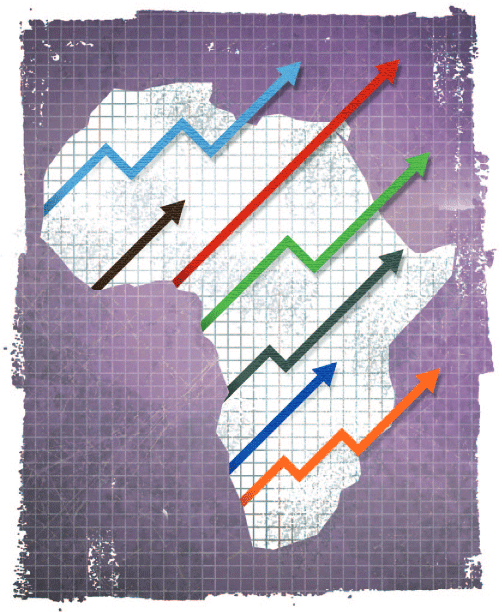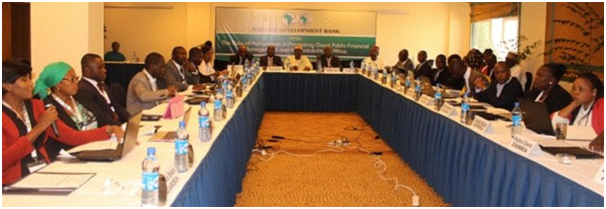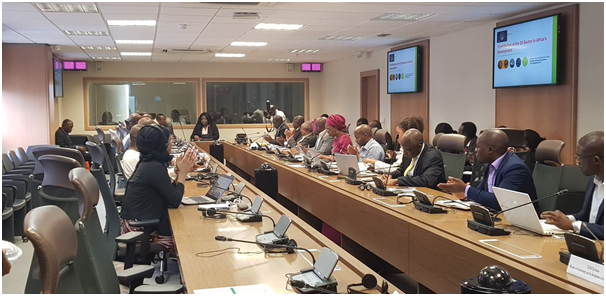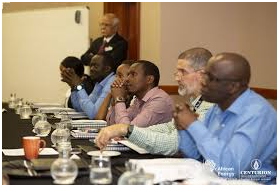
Chancellor Williams,African-American Sociologist, Historian and Writer


Policy Analysis is the process of identifying potential policy options that could address your problem and then comparing those options to choose the most effective, efficient, and feasible one.AU Watch policy analysis bring together groups of scholars and leading practitioners of public policy analysis.
 Conducting a policy analysis ensures we have gone through a systematic process to choose the policy option that is be best for any situation.
Conducting a policy analysis ensures we have gone through a systematic process to choose the policy option that is be best for any situation.
 People who can provide and/or interpret information about the policy
People who can provide and/or interpret information about the policy
Who they are:
How they can contribute: Provide and interpret information we need for our policy analysis
 Who they are:
Who they are:
People whose jobs or lives might be affected by the policy
How they can contribute: Provide contextual knowledge, such as political, economic potential social, educational, cultural and human perspectives
 Who they are: The AU and its members; public officials and administrators.
Who they are: The AU and its members; public officials and administrators.
How they can contribute:
They help AU Watch understands the potential impacts of a policy.
The unit provides cross-cutting analysis and coordination to support decision-making across a highly decentralized organisation.
• Under the JHRC program conducts policy analysis and prepares policy papers and briefs on current, new and emerging inter-related issues of political, economic and social rights in Africa.
• The unit provides policy and program advice on Africa on a wide range of issues pertaining to Africa’s human rights particularly as they relate to Africa’s Human Rights Strategy Program, African human rights system, the implementation of the New Partnership for Africa’s Development (NEPAD) sectoral priorities, peace and security and the African Union’s Agenda 2063.
Our Vision is anAfrica capable of promoting & promoting human rights in Africa. To do that our Policy Analysis Seminars build strategic partnerships, offer technical support, and provide access to relevant knowledge related to the promotion and protection of human rights in Africa.
• To that effect, we conduct research and studies on enhanced regional and international support for Africa’s key human rights institutions, and prepares various reports for our Governing Members and various publics, including on the UN Monitoring Mechanism.
• The unit also provides substantive and technical support to, and participates, as required, in the deliberation of intergovernmental bodies, African Commission, Ecowas and other ad-hoc mechanisms on Agenda 2063 and NEPAD.
In order to implement its mandate, the unit works in close collaboration with:
We:
The Office participates actively in:
NEPAD Heads of State and Government Orientation Committee meetings
 AU Watch’s strong commitment to research, evaluation and learning. More than five years later, our work is driven by equal parts of passion and proof, ideals and ideas. To build a more secure, peaceful, and prosperous Africa through independent analysis and action addressing critical global challenges, AU Watch carries out authoritative research, providing strategic analysis and practical solutions to assist AU decision-makers in both public and private sectors to achieve their goals. This principle of rigorous inquiry and examination guides the way in which we design our programs and deliver our services.
AU Watch’s strong commitment to research, evaluation and learning. More than five years later, our work is driven by equal parts of passion and proof, ideals and ideas. To build a more secure, peaceful, and prosperous Africa through independent analysis and action addressing critical global challenges, AU Watch carries out authoritative research, providing strategic analysis and practical solutions to assist AU decision-makers in both public and private sectors to achieve their goals. This principle of rigorous inquiry and examination guides the way in which we design our programs and deliver our services.
We gather and analyze data, share it worldwide, and help to empower disadvantaged communities in Africa to understand their rights and ability to improve themselves and the region. Toward that end, we never stop questioning. Does our intervention work and is it relevant? Is there another way to do it? What is the impact? The viability? Can it be improved? How? When? For whom? AU Watch’s research agenda is constantly evolving, consistently remaining timely and in demand.Using data, analysis, and consultation with a range of people, we adjust our approach for greater impact. We measure the impact and effectiveness of every program to ensure that we meet each goal and improve the quality of life in communities where we work.It has a high impact, informing AU and AUMS policymakers, international organizations, media and local CSOs.
We also combine research with hands-on day-to-day experience that develops real expertise. That approach enables us to evaluate, course correct, and jumpstart recovery, increasing the likelihood of effective and lasting solutions. By investing in research and evaluation, AU Watch advances human rights, governance and social justice, developing a long-term vision to answer fundamental questions about what works, and why.
All our programs are therefore committed to a process that involves accountability and transparency through monitoring, evaluation, and achievement of measurable results. We also use the Comprehensive Development Framework (CDF) to track the performance of individual projects and tasks by applying four basic principles: a long-term, holistic development framework; results orientation; country ownership; and country-led partnership. A major aspect of our work, especially as respects our M&E, is our willingness to experiment and lean as we go along, taking actions-based on what we are learning.
A major aspect of AU Watch’s M&E approach is our willingness to experiment and learn as we go along and taking action based on what we are learning.

Monitoring and Evaluation Under AU Watch’s 2020-25 Strategic Plan
Starting in the summer of 2018, program objectives have been aligned to our five-year Strategic Plan, and our work will also be evaluated against our progress meeting these priorities. We are developing an Institutional Results Framework to provide a “dashboard” of indicators to monitor progress towards the strategic objectives and to ensure that our work remains aligned with these overall goals. This framework will be the basis for annual reporting to the Board, donors and other stakeholders, and will contribute to our own learning and reflection.
AU Watch will also regularly contract independent consultants to evaluate our work; either as part of grant agreements or independently. We will adopt a policy to evaluate all programs over a two-year cycle. AU Watch will use the evaluation criteria from the OECD-DAC Guidance on Evaluating Conflict Prevention and Peace building Activities, with modifications to our different areas of work on the AU. The modified criteria are: relevance, effectiveness, impact, sustainability, efficiency, and coherence. We will also conduct internal evaluations to assess an AU Watch project. Once an evaluation is complete, the policy should be that programs develop “Management Evaluation Responses” that summarize and reflect on the findings, and develop operational plans to respond to recommendations and address weaknesses that have been identified.
AU Watch has developed monitoring systems to identify and capture consistent, rigorous data from our programs to measure our progress in fulfilling our very ambitious objectives. We are finalizing a monitoring policy that will mandate and provide minimum standards for data collection for all programs. Data is collected by program staff, with support from AU Watch’s Design, Monitoring and Evaluation specialist.
We recognize that not all programs or projects will have the same level of resources, and as a result we are going to use various types of approaches to monitor efforts. In special focus countries with larger programs, such as the Democratic Republic of Congo, Egypt, Mali, Nigeria and South Africa we are developing detailed monitoring and evaluation plans. These will follow a results-based approach (using results frameworks) and rely on precise data collection plans with explicit indicator definitions, methods of measurements, sources of data, collection frequencies, and clearly defined responsibility for collection. In smaller programs that cannot support such intensive monitoring activities, we will implement measures to capture consistent and reliable data on outputs of our most common activities.
We aim to ensure that indicators and data collection methods are consistent across the organization, and that they provide a comparative measure of our outputs in each project. This data will inform the institutional results framework in our three-year strategic plan.
Institutional Learning Unit
AU Watch’s Institutional Learning Unit (IL), a sub-unit within the Human Rights, Outreach and Education Directorate, incorporates DME procedures into our program management. The Unit provides direct technical assistance to all our programs to develop and implement DME systems, assists all program evaluation processes and develops guidelines and policies to ensure effective accountability and learning.
Research and Consultancy
The dissemination of reliable news and information should always be underpinned by robust research and investigative work. Research is therefore at the forefront of developing a richer understanding of what we do. At AU Watch we are committed to research across the board, making us distinct as an organization that also gives practical assistance to people and organizations. Each Directorate will have a dedicated Research Unit, coordinated by the Education Unit within the ‘Human Rights, Outreach and Education Directorate.’ So, in addition to the massive amounts of research produced by the Policy, Programs and Administrative Directorate and the AU Organs Directorate the organization and its various Directorates and units have the capacity to do fundamental research that strengthens the field and shapes its operations.
AU Watch’s Principles for Independent Research
Mission and Public Benefit
AU Watch’s raises funds for the fulfillment of its mission to be a world-leading source of independent news, analysis, informed debate and influential ideas on how to build a citizen-based AU, and a sustainably secure, prosperous and just Africa. AU Watch undertakes work for the public benefit.
Integrity
AU Watch works to avoid any financial obligation which would undermine or contravene the pursuit of its mission and the principles laid out in this document. Sponsorship or financial support of research or events is not an indication of an endorsement of the past or present activities of the source of funding.
Independence and Objectivity
AU Watch always retains independent control over its substantive outputs and public and private events, irrespective of the source of funding. AU Watch fosters objectivity in the research and events conducted under its name, including by pursuing an evidence-based approach to research and engaging a balance of diverse stakeholders in its meetings.
Openness and Accountability
AU Watch applies a culture of openness regarding sources of funding. Anonymity may be granted to donors only in exceptional circumstances and according to specific guidelines. Confidential research and publications can be commissioned from the organization only if this supports its mission and does not constitute more than a small part of its overall annual income, not exceeding five per cent.
Awareness and Responsibility
AU Watch believes that there is no substitute for a culture of awareness among all staff and associates of the importance of these principles. This culture is based on personal responsibility and extends to detailed knowledge of sources of funding and close attention to ethical considerations and potential conflicts of interest.
AU Watch requires the organization’s senior management to promote and support these overarching principles through leadership and by example. Formal processes will be put in place to ensure that these principles are upheld by all staff in their day-to-day work.
More information about AU Watch’s activities can be found in our Annual Review. It contains key developments during the last year and shows how our research, databases and events contribute to what we do in Africa.

Research is embedded in all our programs. We have research units spread across all our areas of interventions. So, in addition to the massive amounts of research and analysis connected with our main research units, the organization is mandated to carry out or commission research and analysis at the country level that strengthens the field and shapes its operations.
These researches target a variety of audiences, including law and development practitioners, policymakers, national and international organizations, academics, students, media professionals and grass root communities. The objective is for such projects to produce a variety of outputs, including edited volumes, policy and research briefs, guidelines and principles, and reports of different kinds.
The Chapters also carry out research projects in collaboration with local colleges and universities that are comparative in nature, (sub) regional in scope, and on topics which other AU Watch directorates do not have the resources to do. These projects are designed to be policy friendly, and at the same time normatively rich, so as to contribute to giving content to issues AU Watch is promoting.
We base our decision on a number of factors. These include: the urgency or importance of a situation; an instruction from our Governing Council, and whether our intervention we can add value to international understanding and response. Research is also resource capital intensive. We suppose the final criteria is whether we have the tools and money to undertake any work.
AU Watch’s researchers and analysts are drawn mostly from universities, experienced former AU diplomats, journalistsand NGO staff. They are oftenexperts in their areas.
• We conduct ground-breaking and innovative research.
• Through our research, media work, and publications we hold the AU and AUMS to the standards they have set for themselves.
• We partner with the AU and other organizations to let change happen.
• We use the media (radio and TV and other social media platforms) to broadcast our research results and messages.
• Using our network of scholars and experts, we give advice to the AU, its Members, local and international organizations on how to most effectively secure human rights and achieve social justice, albeit in complex and changing African landscape.